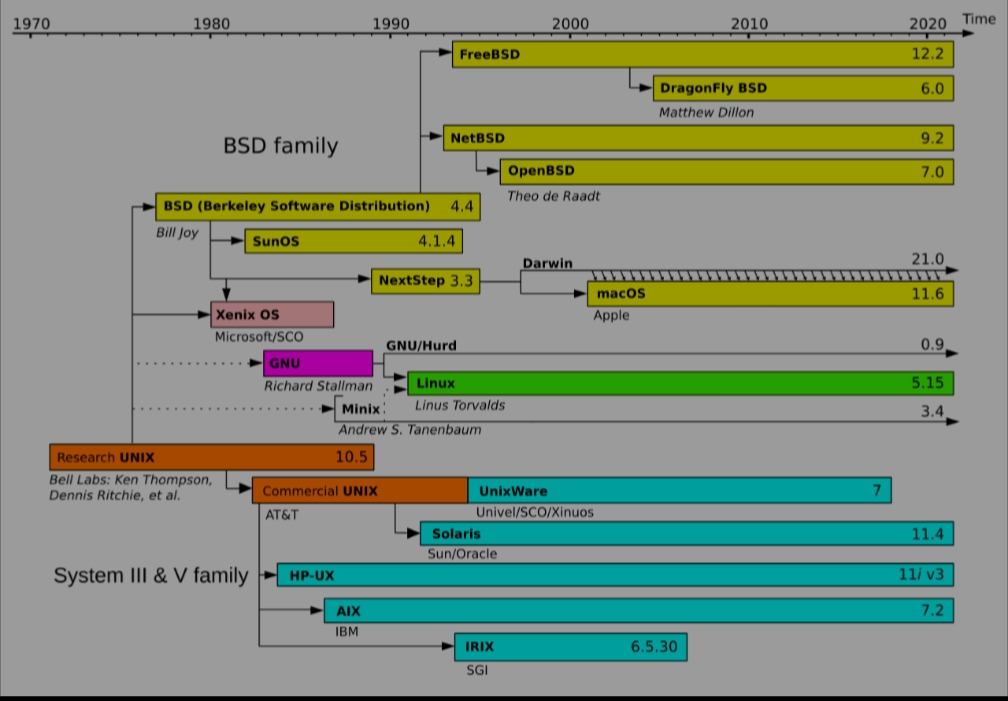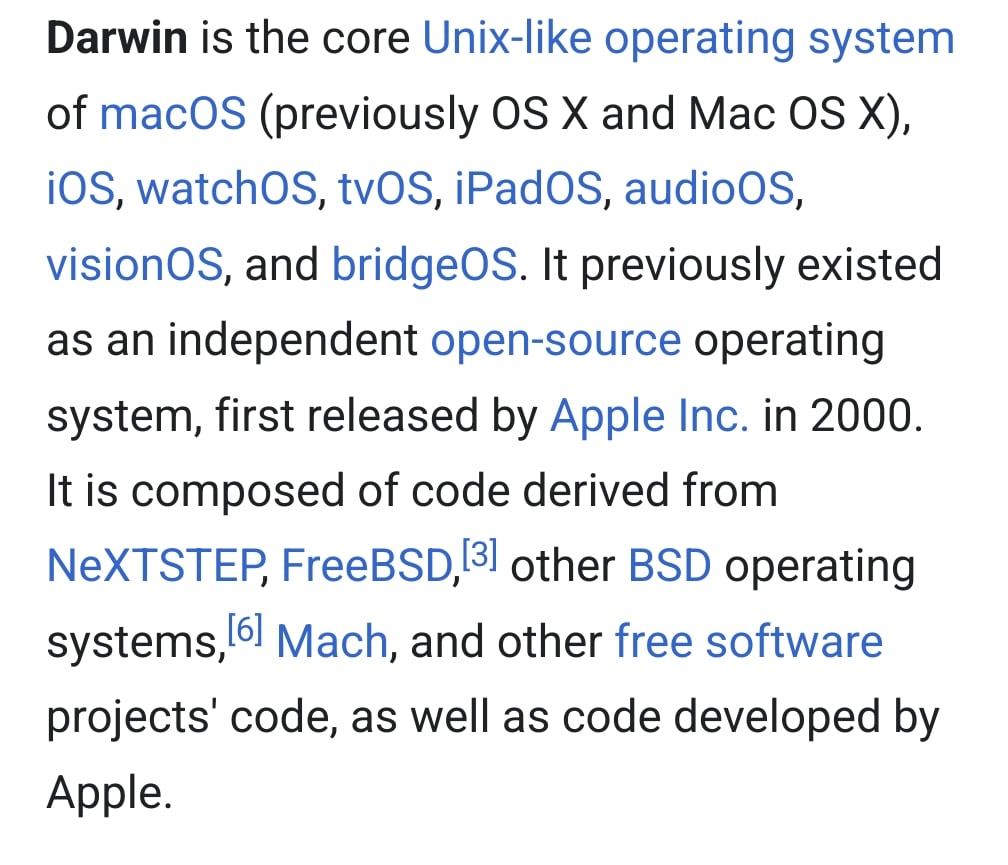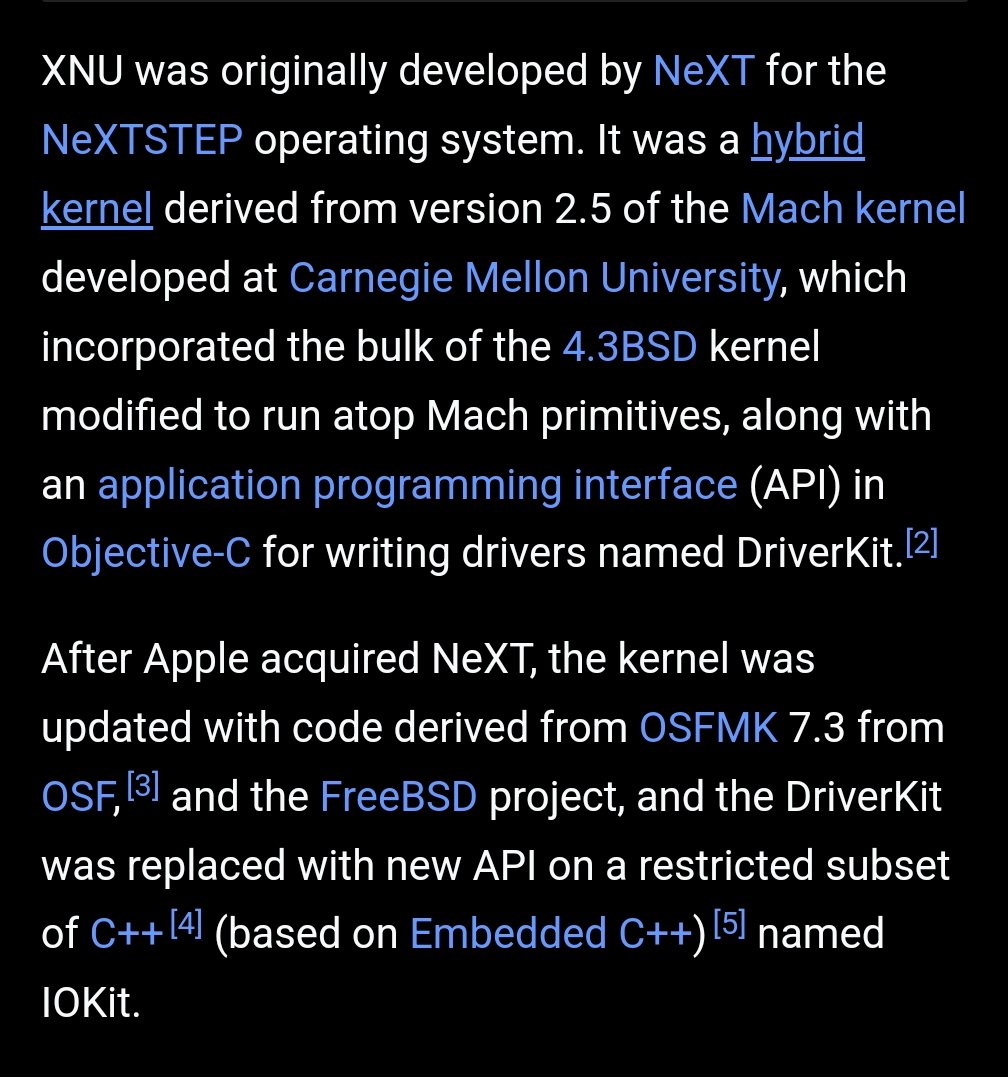Whilst BSD isn’t linux per se, it still has a lasting legacy in the unix like space and notably has been used in game consoles like the PS4.
For you in your personal use case, have you tried a bsd distro? What was better compared to the average linux distro?
Apparently BSD is more modular with its jailing system and seems to have a lower resource usage.
I look at ones like NETBSD and FreeBSD and think, "what exactly do I get out of them that I wouldn’t with Linux say, Ubuntu or Void as an example?
What are your thoughts on BSD, you use FreeBSD before?
The majority of the Internet’s routing and switching architecture is BSD based. Historically it had the most stable and performant network stack of all the OSs.
I used it extensively at one job in a previous life when I was a network appliance developer. It was rock solid and lightning fast. Tried it as a desktop at home and had a terrible experience.
The little differences in the Unix commands used to drive me nuts as well…
Had isn’t Linux faster now. I know on the very resource restrained box I used li ix had noticeably faster network. Went from 500 ish to full gigabit speeds.
It very well could be these days. It could also be default settings that are better on Linux for certain activities. The network stack is highly tunable.
I use OpenBSD as my daily driver on the desktop.
In my opinion Linux over the years got too caught up in politics and involved with big corporations having influence on certain non-trivial decisions.
But I also think the BSDs are better actual Operating Systems in contrast to Linux being only the kernel of which different projects make use of to provide their final products to the end user, its way more fractured.
Using a security focused Distro which has its use case in network devices as a “daily driver” shows that you priorities are “elsewhere”.
You clearly don’t know what you’re talking about. OpenBSD is an absolutely legitimate Desktop OS and has no special use case. Its hardened and comparably slower than Net- and FreeBSD, but thats it . Guess you’re an “expert”.
has no special use case. Its hardened and comparably slower than Net- and FreeBSD
😂
Thats when you’re out of arguments, ladies and gentlemen.
The equivalent of facebook boomers reacting with a laugh emoji.
But seriously: several people in the BSD community use OpenBSD on the Desktop, Theo De Raadt also does in contrast to a lot of FreeBSD devs that use MacOS as a daily driver.
Don’t know why you’re so full of yourself when you clearly have no expertise on the subject.
A bit late, but wow openbsd developers use their own distro as a desktop, you convinced me. And yes I know it might sound weird but openbsd has a special use case. Its a security focused distribution aimed at developers which want to understand the workings of an OS. Its also used as a base for some router specific operating systems.
Everybody who used OpenBSD on the desktop knows it has its shortcomings compared to any other OS if your workload extends beyond simply checking mails and surfing the web.
You’re just wrong. There is a whole community, including me, using OpenBSD as a daily driver.
You can mention more things turning YOU off from using it that way, but it won’t change shit, lol.
Just because people doing it doesn’t mean its the best thing to do. Also how can I be wrong, you can disagree with me. Obviously I am stating my opinion on this matter. But so far I haven’t seen any real arguments from your side contradicting what I said.
BSD is well designed and cohesive but has many more missing bits and contraints than Linux. So, if you are in its sweet spot, it is awesome and maybe better than Linux. However, outside that it can be totally unusable.
For me, the biggest issue is the lack of software. There is both a mountain of it as it is of course an POSIX compatible OS and at the same time it is trivial to need important software that is missing.
As a desktop, it therefore feels very nice and also very limiting.
I love that it is actually real UNIX with an unbroken history back to the beginning. I find that really compelling. At the same time, I always get “bored” using it because it inevitably does not support what I want to do.
I am still hoping Chimera Linux finds a sweet spot that melds the two worlds in a nice way.
Chimera Linux is actually really nice. Been daily driving it for a little bit, and as long as you don’t have an Nvidia GPU, it should work just fine.
I tried FreeBSD on a laptop.
It spammed error messages all over the installer’s TUI until I disabled my fingerprint reader in BIOS.
Then I had to patch and recompile the kernel to get it to talk to my laptop’s battery sensor.
Then there were half a dozen other issues I solved one by one, like getting the touchpad and the camera to work, and auto-detecting my networked printer/scanner.
Then I read up on why WiFi is so unbearably slow, and the solution was to pass-through a WiFi driver from inside a Linux VM.I didn’t actually notice any end-user advantage of having a “fully integrated system” either, so I gave up and went back to Linux.
I’ve not used BSD, but this is cracking me up because this reads like the “Linux Sucks back to Windows” threads from 10 years ago.
I’ve used Linux for 20 years now, and yes the experience was similar to back then.
But back then, there wasn’t a better FOSS option. Now there’s modern Linux.
Don’t get me wrong, I think BSD is a great system. It’s just not the right OS for a new-ish convertible laptop.
I have used all 3 major BSDs (Free, Open and Net). FreeBSD is ideal for servers due to its performance. OpenBSD is perfect for security appliances and NetBSD is perfect if you have exotic legacy hardware.
This being said, I have also used OpenBSD for about two years as my daily driver on an old second hand laptop, and I really liked it. With a minimum of configuration, installing software was as easy as Debian (just your pkg_add), and configuration is just super easy since the OpenBSD documentation.
It has improved a lot done then: installing security updates (sysupdate) and upgrading (sysupgrade) from one version to the next is amazingly simple. If your hardware is supported, OpenBSD is just a pleasure to use. Its only default is the lack of “advanced” file systems and volume managers.
I tried PC/BSD on a desktop quite a few years ago and it was pretty good, apart from having to build a lot of my software from their ports tree. That ultimately put me off and I went back to Linux. I tried FreeBSD on an old laptop last year and no matter what I tried, I couldn’t get it to recognize my Wifi adapter. I gave up after a couple of days.
So, if your hardware is supported BSD is good, but if it’s not than it’s really not.
I use it every day. On my MacBook running MacOS 😬
Seriously though, I tried putting FreeBSD on my Linux laptop a few years ago and it was not a fun time. Reminded me a lot of running Linux on desktop in the 2000s when I first discovered Linux.
I’m rooting for them though. I like the idea of keeping development and documentation so tightly integrated and maintained by a single dedicated company.
MacOS is actually not a BSD as some people like to think. It is Unix, it used to be posix tested but it has never, ever been a BSD. MacOS is based on the mach kernel, a kernel that was intended to replace the BSD kernel for a GPL licensed Unix. Most of the people who wanted a GPL Unix just went with Linux in the end. We are still waiting to see what Hurd has to off though. https://en.m.wikipedia.org/wiki/Mach_(kernel)



Your point is well taken and I appreciate expanding my knowledge on this a bit, but I don’t think that it is that cut and dry. Mach, the kernel from which both is not Unix. Mach is basis for XNU (X is not Unix, sound familiar). From the screenshots from Wikipedia, pretending that BSD is not embedded within MacOS is just trying to obfuscate things. The Mach virtual memory manager for instance is in FreeBSD, so it goes the other way around as well.
https://en.wikipedia.org/wiki/Mach_(kernel)?wprov=sfla1
https://en.wikipedia.org/wiki/Darwin_(operating_system)?wprov=sfla1
One thing no one mentioned is the license. I won’t touch BSD because if any BSD system gets good enough, a big corpo can fork it, get slightly ahead, and then never give back.
Source: MacOS
BSD developers: who cares about that. And, it is already happen. Android libc use lots of code of OpenBSD libc. OpenSSH is used everywhere.
GNU’s ssh implementation seems to be some abandoned trash, even though it was started in 1998, before OpenSSH. If OpenSSH doesnt exist, we can hope that everyone will be using differently broken ssh implementations; I’d expect gnu ssh to be a buggy, unreliable implementation which support hundreds of thounsands of flags and configuration options. Workers everywhere will be punished because of their buggy implementation of ssh. Why workers in every companies have to make their own ssh implementation? They should be doing something else.
OPNsense is the best firewall, IPS, and IDS I’ve used. If they made a Linux version of that OS I’d switch to that in a heart beat becuase of driver compatibility
You may already know this but you can run OPNsense on top of Proxmox. That may mitigate the driver issues you are having.
For a server - it’s fantastic if you’re a reasonable adult and if you don’t have a compulsive need to install every shiny new “app” you find on the internet. Terrible if you hate reading any kind of documentation. Terrible if you already decided that some of its core concepts are stupid and try to force stuff in order to mimic your favorite Linux dist.
Takes some knowledge and planning to set everything up properly but when it works, it works forever.
ZFS works as intended. I hear that it’s miles better these days though in Linux.
Jails will make your life so much easier.
If the software isn’t available in the ports tree you don’t need it. You may want it but you really don’t need it (bro just download my Docker image, I wrote a webserver in rust bro I promise it’s super stable and it’s never been done before bro). Enable Linux binary compatibility or fire up a virtual machine with a tiny dist if you’re a masochist.
I personally like the default firewall, pf. It’s got a bad reputation in some circles though.
No systemd.
No systemd.
No systemd.








